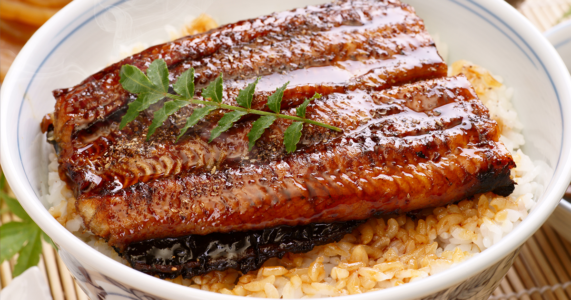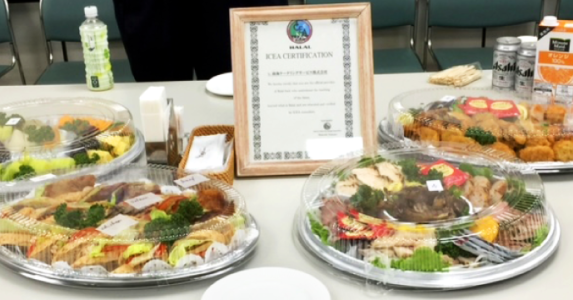How to find halal food & items by ingredients in Japan
When travelling in Japan, finding Muslim-friendly/halal drinks or snacks at the local 7Eleven, supermarkets and such can be hard since all the labels are in Japanese with unfamiliar kanjis.
Today, let’s focus on what you should pay attention to in such situations with some useful tools for your trip.
If you live in a Muslim-majority country, finding halal food is easy as ABC. Having the halal mark on most products is considered something very natural. In fact, you can even spot “Non-halal” labels at non-halal restaurants or supermarket corners in countries like Malaysia (where I’m from).

On the other hand, Japan is a country with very few Muslims. Naturally, you will see products with pork or other forbidden ingredients sold in the local stores. Of course, this doesn’t mean that there are no Muslim-friendly products.
You just have to be more careful than most Muslim-majority countries when buying things at stores like the local konbini (convenience store), supermarkets, pharmacies and more.
So here’s what you can do to find products that are Muslim-friendly, especially in stores that doesn’t sell halal-certified or international products.
Ingredient-checking is the Key
What you should do when shopping in Japan—— read the ingredients. This has become a habit for many Muslims living in Japan, including me. Reading the ingredients will help you to determine whether you can consume/use that product or not.
These are HARAM (must avoid) and DOUBTFUL (unsure until source confirmation) ingredients we, Muslims living in Japan, often find in an item. I only compiled the list as a reference to help you buy items at your own discretion.
To easily access this guide during your trip, you can also download our complete ingredient guide for free at the end of this article. The free-to-download guide also include common words to look out for (which I didn’t write in this blog).
◆ HARAM Ingredient List—Meat & Fat/Oil
| No | Kanji | Katakana | Romaji | Meaning | Memo |
|---|---|---|---|---|---|
| 1 | 豚肉 | ポーク | Buta-niku/Pooku | Pork | 豚 (buta): pig |
| 2 | 牛肉* | ビーフ | Gyuu-niku/Biifu | Beef | 牛 refers to cow |
| 3 | 鶏肉* | チキン | Tori-niku/Chikin | Chicken | 鶏 refers to chicken |
| 4 | 肉エキス | Niku-ekisu | Meat Extract | ・肉 (niku): meat ・エキス (ekisu): extract | |
| 5 | (No. 1–3) + エキス | (No. 1–3) + エキス | ・Buta/Pooku ・Gyuu/Biifu ・Tori/Chikin + Ekisu | (Pork / Beef / Chicken) + Extract | |
| 6 | 羊肉* | ラム/マトン | You-niku/Ramu/ Maton | Lamb/Mutton | 羊 refers to sheep |
| 7 | ハム | Hamu | Ham | ||
| 8 | ベーコン | Beekon | Bacon | ||
| 9 | 動物性油脂 | Doubutsu-sei-yushi | Animal Fat | ・動物 (doubutsu): animal ・油脂 (yushi): fat | |
| 10 | 獣脂 | Juu-shi | Tallow (animal fat) | ||
| 11 | 豚脂 | ラード | Ton-shi/Raado | Pork Fat/Lard | |
| 12 | 牛脂 | Gyuu-shi | Beef Fat | ||
| 13 | 動物脂 | Doubutsu-abura | Animal Fat | 脂 (abura): fat | |
| 14 | 混合油脂 | Kongou-yushi | Mixed Fat | ||
| 15 | 加工油脂 | Kakou-yushi | Processed Fat | ||
| 16 | コンソメ/コンソメパウダー | Konsome/Konsome paudaa | Consommé (soup)/ Consommé Powder | Usually made of chicken | |
| 17 | ブイヨン | Buiyon | Bouillon (broth) | ||
| 18 | ゼラチン | Zerachin | Gelatine | ||
| 19 | 胎盤エキス | プラセンタエキス | Taiban-ekisu/ Purasenta-ekisu | Placenta Extract | Usually in cosmetics or supplements. Most placentas are animal-derived |
◆HARAM Ingredient List—Alcohol Additive & Alcoholic Beverage
| No | Kanji | Katakana/ Hiragana | Romaji | Meaning | Memo |
|---|---|---|---|---|---|
| 1 | 酒 / 清酒 | さけ | Sake / Sei-shu | Sake (alcohol beverage) | 酒 refers to alcohol (especially alcoholic beverages) |
| 2 | アルコール | Arukooru | Alcohol | ||
| 3 | 洋酒 | You-shu | Western Liquor | ||
| 4 | 酒精 | エタノール | Shu-sei | Ethyl Alcohol | Depending on the concentration and source, some ulama and fatwa says it is permissible. You would have to contact manufacturer to confirm. |
| 5 | ビール | Biiru | Beer | ||
| 6 | 味醂 | みりん | Mirin | Mirin (sweet cooking rice wine) | |
| 7 | リカー | Rikaa | Liquor | ||
| 8 | リキュール | Rikyuuru | Liqueur | ||
| 9 | ワイン | Wain | Wine | ||
| 10 | ブランディ | Burandi | Brandy | ||
| 11 | ウイスキー | Uisukii | Whiskey | ||
| 12 | ラム酒 | Ramu-shu | Rum | ||
| 13 | 料理酒 | Ryouri-shu | Cooking sake | ||
| 14 | 発酵調味料 | Hakkou-choumiryou | Fermented seasoning |
◆ DOUBTFUL / SYUBHAH Ingredient List
DOUBTFUL ingredients refers to an ingredient that can be halal or non-halal depending on what it is made of (source), either it’s animal- or plant-based. Sometimes the label on an item may actually wrote the source.
Let’s take 乳化剤 (emulsifier) as an example, which can be derived from animal or vegetable.
In the photo, the ingredient label has “乳化剤” followed by, in a bracket, (大豆由来), which means soybean-based. That means it’s permissible since “soybean” is plant-based. If there’s no bracket after “乳化剤”, you can confirm the source by contacting the manufacturer directly.
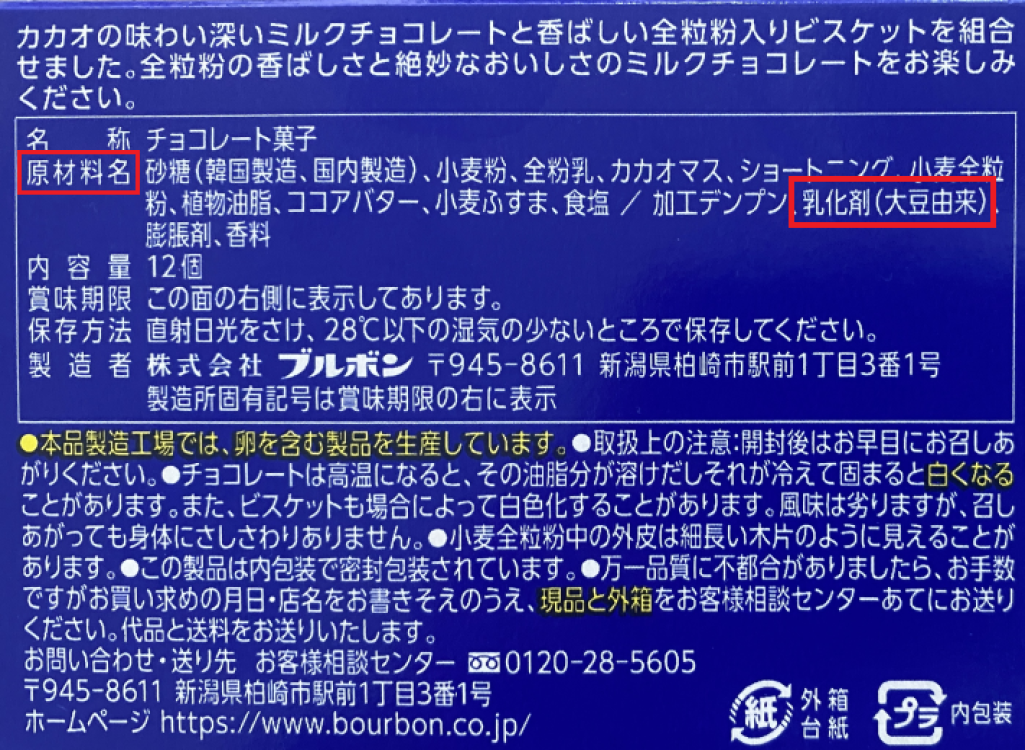
| No | Kanji | Katakana/Hiragana | Romaji | Meaning | Memo |
|---|---|---|---|---|---|
| 1 | ショートニング | Shootoninggu | Shortening | Can be derived from animal or vegetable oil. If it is written that the source is 大豆由来 (Daizu Yurai = soybean-based) or 植物由来 (Shokubutsu Yurai = plant-derived), then it’s OK for Muslims. | |
| 2 | 乳化剤 | Nyuukazai | Emulsifier | Can be derived from animal or vegetable oil. Same as No.1 | |
| 3 | マーガリン | Maagarin | Margerine | Can be derived from animal or vegetable oil. Same as No.1 | |
| 4 | 醬油 | しょうゆ | Shooyu | Soy sauce | Some may contain alcohol |
| 5 | 味噌 | みそ | Miso | Miso (Japanese fermented soybean paste) | Some may contain alcohol |
| 6 | 酢 | Su | Vinegar | Some may contain alcohol | |
| 7 | アミノ酸 | Amino-san | Amino Acid | ||
| 8 | 生クリーム | Nama-kuriimu | Fresh Cream/Heavy Cream | ||
| 9 | 醸造酢 | Jouzouzu | Brewed Vinegar | ||
| 10 | コラーゲンペプチド/コラーゲン | Koragen pepuchido/ Koragen | Collagen Peptide /Collagen | Can be derived from marine (fish) or animal (pork, beef, chicken) | |
| 11 | ファットスプレッド | Fatto Supureddo | Fat Spread | Can be derived from animal or plant. Same as No.1 | |
| 12 | 油脂 | Yushi | Fat | If it is vegetable fat, then it’s OK. ・植物 (shokubutsu): plant, vegetable | |
| 13 | レシチン | Reshichin | Lechitin | Can be derived from animal or vegetable. Same as No.1 | |
| 14 | たんぱく加水分解物 | Tanpaku Kasui-bunkai-butsu | Hydrolyzed protein | Can be derived from animal or vegetable. Same as No.1 |
Manufacturers may change the source used in the ingredients, so what you can eat/use NOW may turned out not okay in 3-4 years LATER. This is also why reading and re-checking the ingredients are crucial. Let’s check out some helpful tools you can use in Japan.
Helpful Page & Tools for Your Purchase
If you don’t feel confident reading the Japanese labels, these can be handy for your food/item search in Japan. Please note that the ones I’m introducing here is more for searching products in the local konbini, supermarkets, pharmacies and the like that don’t usually handle halal items.
◆ Facebook Page: Halal Japan
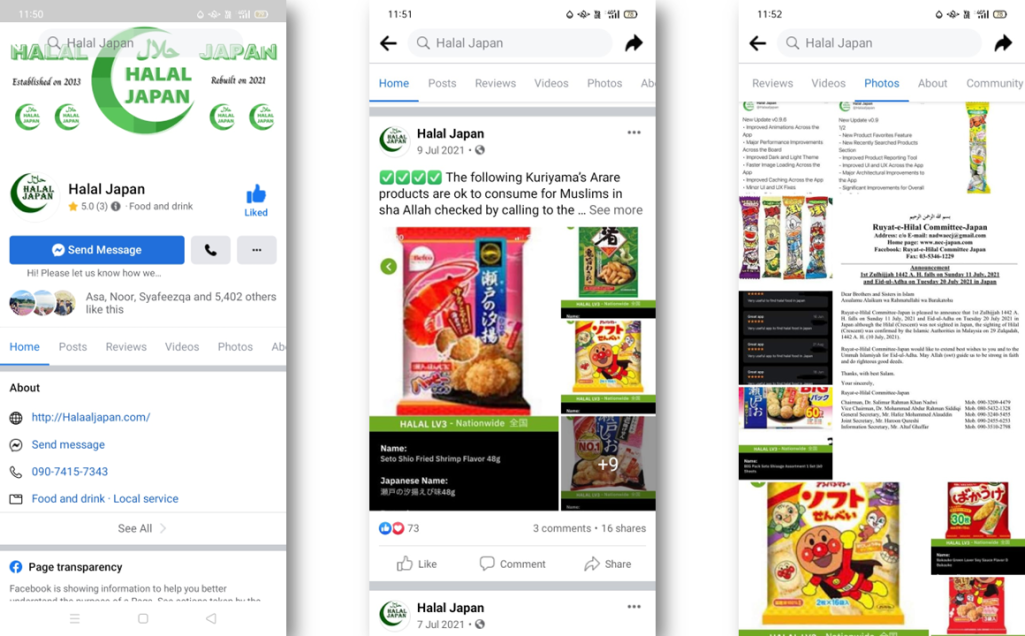
This page has helped me A LOT since I first came to Japan in 2015. It is a page run by a group of Muslims since 2013 that checks all kinds of products (canned coffee, bread, ice cream, baby powder, etc.) whether they are safe for Muslims or not.
What I like about this page is the admin also does regular updates. As I mentioned above, manufacturers may change the materials, so this is very helpful.
FYI, the page was hacked in 2021, so this is its new page. That is why the products seem fewer than before. But GREAT NEWS—the page has an app now!
◆Smartphone App: Halal Japan (Beta)
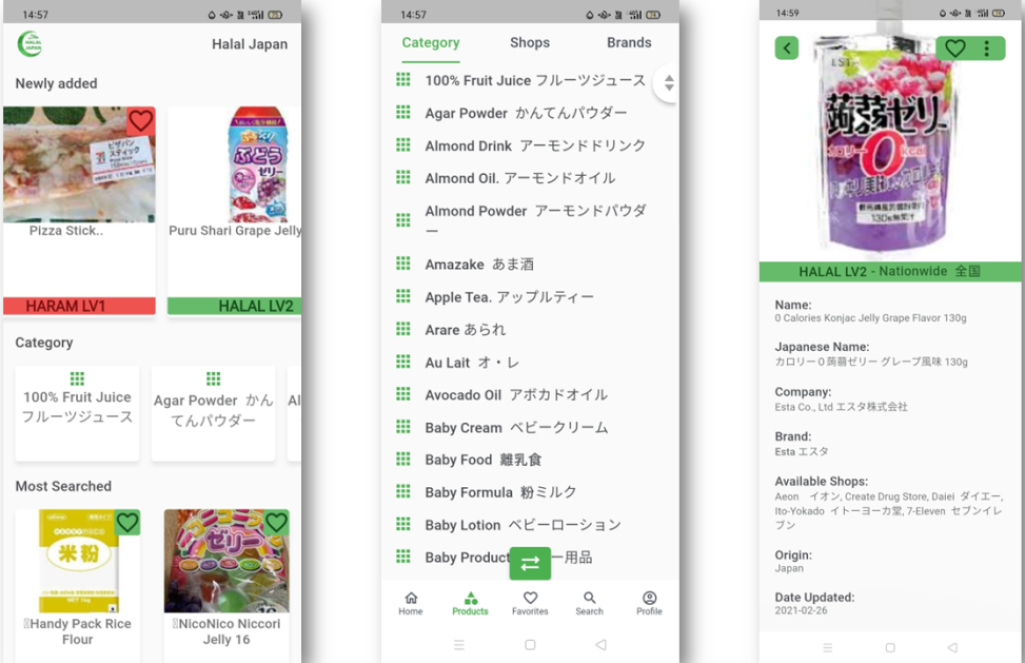
You can easily search for products you can and cannot use/consume with the Halal Japan app. It currently has over 16,000 products with ingredients already checked with the manufacturers. You can either check through its product list or by scanning the barcode on products.
Each item includes information such as its halal-ness, the date updated and which stores you can get it (the right one on the photo above). It categorizes the halal-ness into different levels.
| HALAL LV1 | Halal-certified |
| HALAL LV2 | Free from ethanol, 100% free from pig derivatives |
| HALAL LV3 | Has less than 0.5% ethanol / Production line shared with pig derivative products but has no risk of cross-contamination |
| DOUBTFUL | Manufacturer doesn’t disclose the basis of the doubtful ingredients, or doesn’t know the alcohol base/ethanol percentage |
| HARAM LV1 | Has pig-based, non-halal animal or alcohol-based ingredients |
| HARAM LV2 | Production line is contaminated with pig derivatives |
It currently runs on subscription as the app is still in the beta phase, but it has a “free trial for 7 days”. The subscription could be a temporary thing since it’s the beta version (this is just my guess). Nonetheless, I am satisfied with this app; There’s definitely room for improvement.
You can download the Halal Japan (Beta) app on the App Store (iOS) and PlayStore (Android).
・iOS: https://apps.apple.com/jp/app/halal-japan/id1548302210
・Android: https://play.google.com/store/search?q=halal%20japan&c=apps&hl=en&gl=US
Another suggestion is using Google Lens to read and automatically translate the Japanese ingredients for you. Since its Google Translate, there may be some mistranslation here and there. But it still can be helpful in recognizing those kanjis (lol).
If I ever find other useful tools similar as this, I will definitely introduce them. Happy shopping!!
▪ Download Complete Ingredient Guide for Muslims
We have a network of Japanese companies keen to expand into the Halal market in Malaysia & Indonesia.
If you are interested in connecting with sustainable technology companies in Japan, simply JOIN the network from below. We will match the right one for you!



